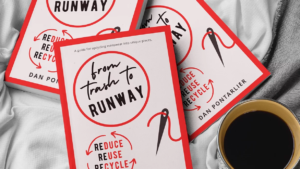Is upcycling the most important culture-shift for waste reduction in the fashion industry today? Dan Pontarlier believes it is the only possibility we should consider. How can we continue to donate our clothes if it means contributing to a linear waste model? Founder of Sustainable-Man, Pontarlier explains why we should all be focusing on reuse and repurposing our clothes for a sustainable future.
Words by Dan Pontarlier
Header Image: Francois Le Nguyen
“Sustainable fashion is on the rise and we know it. Unfortunately at the same time, fast fashion brands keep on gaining terrain during this period due to economic recession and the consumption habits that we have.
We keep buying new things, even though there are shocking facts about the misuse of the clothes we have in our wardrobes.
On the one hand, people do not wear at least 50% of the clothes they have in their closet. According to the results of a survey of 18,000 people, 88% of the clothes in the wardrobes of Belgian citizens have not seen the light of day, followed by the USA and Italy with 82% and 81% respectively, Switzerland and Canada with 79%, Norway with 77% and Spain with 76%.
On the other hand, donating clothes may sound easy, but it’s not really that simple. The final destination may not be resale in a nearby thrift store or donated for charity, but may add up to the tons we already find in landfills or send to developing countries. In this last case, harming the local production industry, as has happened in some East African countries.
It is for these reasons that I treat this book as a contribution to society, to try to make a better world by reusing our clothes and not turning them into waste. To teach men that following our tastes and instincts we have ways of being able to reform our wardrobe without spending practically money and looking better.
By developing upcycling activities with your clothes, you will be able to expand your creativity, and that has positive effects.
- Being creative makes you able to solve problems in your personal and work life in an easier way.
- Creativity helps you see things differently and manage the unforeseen in a better way.
- Creativity helps you live better in situations of uncertainty.
We need more commitment in the fashion industry, both from companies and from consumers. As consumers we need to start asking questions and to be more crafty. How many things have you cluttered in your closet that you haven’t worn in a long time?”

Dan’s new book “From Trash to Runway” is a guide to upcycling the clothes in your wardrobe. A resource on sustainability in the fashion industry, as well as 20 unique menswear designs to try yourself.
“Upcycling your own clothes is not as complicated as it seems, and I am proof of that. I have done my own projects with pieces that I had in my wardrobe without even knowing how to sew. The only thing that I had clear was the piece that I wanted to create, and relying on local seamstresses I was able to achieve it.
Spoiler alert: better than buying in H&M, and cheaper than buying expensive sustainable brands. Besides, what is more sustainable than transforming something that already exists?”
Here’s what renowned author, sustainable fashion authority and British journalist Lucy Siegle, had to say about Dan’s book, From Trash To Runway:
“In order to defeat the linear take-make-and-waste model of living that wreaks such havoc on the planet’s life-sustaining resources, we need visionaries. Dan Pontarlier is that person for fashion. He makes upcycled fashion aspirational and accessible to everyone.”
Join the #fromtrashtorunway community on instagram @fromtrashtorunway
 Spanish native Dan Pontarlier is a sustainability consultant working in the hospitality and fashion industries. Combining his love of fashion with an MBA in Tourism, Sustainability and ICT, Pontarlier founded Sustainable-Man.com to encourage waste-reduction in the fashion industry. Dan is founder of DP the label, co-founder of the European Sustainable Hospitality Club, Board Member at the Global Sustainable Fashion Week and author of the recently published book about clothing upcycling From Trash to Runway. Read more about Dan’s work and to purchase a copy of his latest book head to www.danpontarlier.com
Spanish native Dan Pontarlier is a sustainability consultant working in the hospitality and fashion industries. Combining his love of fashion with an MBA in Tourism, Sustainability and ICT, Pontarlier founded Sustainable-Man.com to encourage waste-reduction in the fashion industry. Dan is founder of DP the label, co-founder of the European Sustainable Hospitality Club, Board Member at the Global Sustainable Fashion Week and author of the recently published book about clothing upcycling From Trash to Runway. Read more about Dan’s work and to purchase a copy of his latest book head to www.danpontarlier.com
Header Image Credit: Francois Le Nguyen – “Sorting through hundreds of tons of clothing in an abandoned factory for a social mission called Clothing the Loop” [Cambodia]


